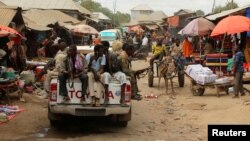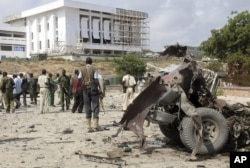America’s presidential elections may be getting much of the world’s attention right now, but in the Horn of Africa, another country’s electoral season is also underway.
Somalia hopes to elect a president, as well as members of two houses of parliament, by the end of November. Somali parliament member Abdiweli Qanyare says overall, the election process is going smoothly.
“So far, we are not seeing much complaint,” said Qanyare. “But anyway, wherever elections happen, there are people who will complain and people who will say it’s not fair. Even in the first world. So, legitimacy at the moment is fine.”
The Special Representative of the U.N. secretary-general for Somalia, Michael Keating, says there are challenges in conducting the elections, like security threats, since Somalia is attempting to recover from three decades of war and lawlessness, while still battling threats from al-Shabab. Also, there is the absence of a national ID system, and a lack of institutional capacity and memory.
“I’m cautiously optimistic that this is going to go well, even though it’s going to be very messy and even though, as somebody said to me, it is possibly the most complicated electoral process on planet Earth, of all time,” said Keating.
New parliament
There will be a new federal parliament, consisting of an upper and lower house. State assemblies will elect the 54 members of the upper house. The lower house will consist of 275 members, elected by 14,025 delegates selected by 135 clan elders.
Voting for upper house candidates has begun, while polls for the lower house are scheduled to start Sunday, Oct 23. Both houses will then elect Somalia’s president on November 30.
But not everyone, including Abdi Samatar, a Somali-born economic geographer at the University of Minnesota, is pleased with the arrangement.
“This is not an election, Jill, it’s a selection,” said Samatar. “A group of people are going to pick up candidates for parliament. Ordinary citizens have no way of influencing that, in any sense of the word. So it’s really a charade of a selection, of an election, I should say.”
International concerns
The United Nations, African Union, United States and European Union issued a joint statement October 16 expressing concern that “individuals with a history of criminality, violence and terrorism” are being presented as candidates for the upper house of parliament, saying it represents a “regressive step.”
But parliament member Qanyare argues that if someone has not been found guilty of doing something “illegitimate,” they have the right to run for office.
“Because, according to our constitution, it says that someone can be elected if he has not been convicted in the court [in] the last five years,” said Qanyare. “So I believe they are within the framework of the legality.”
Keating says that rejecting candidates who have been implicated in rights abuses would reaffirm Somalia’s commitment to ending the culture of impunity.
“But if we get through this and the results are legitimate, and it is not marked by excessive violence, then it is a huge confidence boost for Somalis, and it’s going to really set the stage for Somalia to go to another level,” said Keating.
Many are hoping that next level includes nationwide one-person, one-vote elections by 2020.






